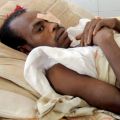NEWS
Ireland announces more abuse compensation funded by religious orders
By Michael Kelly, Catholic News ServiceDUBLIN - Some 15,000 former residents of state-funded, church-run institutions in Ireland will be able to apply for further compensation for abuse they suffered, the government announced April 17.
The new compensation fund will be financed from the cash contributions of up to $144 million (110 million euros) offered by the 18 religious congregations involved in running the institutions. The government has already paid out nearly $1.8 billion.
Anishinaabe elders adopt Archbishop Weisgerber
By James Buchok, Canadian Catholic NewsWINNIPEG - Anishinaabe elders and community leaders adopted Archbishop James Weisgerber of Winnipeg as their brother April 14 in a traditional ceremony at Thunderbird House in Winnipeg, the first event of its kind in the reconciliation between Indian residential school survivors and missionary churches.
"This is part of a long journey for me," Weisgerber said.
As a priest in Saskatchewan, he had been a pastoral minister at four of what were then called Indian reserves, "but nobody ever talked about the residential schools," he said. In 1990, Phil Fontaine, former National Chief of the Assembly of First Nations, "made a public declaration and released a huge barrage, and more people began speaking and I began to understand," Weisgerber said.
Fr. Crowe’s life dedicated to Lonergan’s philosophy
By Michael Swan, The Catholic RegisterTORONTO - Jesuit Father Fred Crowe’s long, happy and productive life came to a peaceful end Easter Sunday, April 8. He was 96 years old and had spent 76 years living the vows of a Jesuit.
“The last years of his life he just kept writing,” said Jesuit Father Gordon Rixon. “He was one of those Jesuits who was in the library by 5:30 in the morning.”
For most of the last 60 years, Fr. Crowe was in the library carefully collecting, editing, explaining and interpreting the work of his seminary professor, Fr. Bernard Lonergan. Lonergan was a Canadian Jesuit who became a towering figure in philosophy and theology.
Unrecognized Chinese bishops detained by government released
By Catholic News ServiceHONG KONG - Two Chinese bishops not recognized by the government were freed by authorities on Easter, church sources told the Asian church news agency UCA News.
Coadjutor Bishop Peter Shao Zhumin of Wenzhou, in eastern Zhejiang province, and Bishop Peter Jin Lugang of Nanyang, in central Henan province, were detained, respectively, for four weeks and for four days.
Catholics ask world leaders to help determine Sudan-South Sudan border
By Dennis Sadowski, Catholic News ServiceWASHINGTON - Saying civilian lives are at risk, Catholic leaders appealed to the international community to step up efforts to prevent full-scale war from erupting over disputed territory along the tenuous Sudan-South Sudan border.
Auxiliary Bishop Daniel Adwok Kur of Khartoum, Sudan, said in an email to Catholic News Service that tensions between Sudan and South Sudan, the world's newest nation, could be defused if the United Nations and the African Union would mediate the differences and attempt to determine the proper border between the two countries.
Major exhibit of late pope's artifacts will open in New Orleans in 2013
By Peter Finney Jr., Catholic News ServiceNEW ORLEANS - A major exhibit of the personal effects of Blessed John Paul II, titled "I Have Come to You Again," will open its three-city U.S. tour in the Archdiocese of New Orleans in February 2013, and the exhibit organizer who has handled four previous Vatican exhibits in the United States said he was bracing for record crowds.
Joining Archbishop Gregory M. Aymond of New Orleans April 13 to formally announce the exhibit was Father Malcolm Neyland, a priest of the Diocese of Lubbock, Texas, who also serves as director of the nonprofit National Exhibits Association.
Bavarian band, dancers celebrate Pope's birthday in apostolic palace
By Carol Glatz, Catholic News ServiceVATICAN CITY - Pope Benedict XVI celebrated his 85th birthday with guests who treated him to Bavarian "oompah" music and folk dancing in the apostolic palace.
Bavarian bishops, minister-president of Bavaria -- Horst Seehofer, and a 150-person regional government delegation visited the Pope April 16 in the Vatican's Clementine Hall.
Vatican reaffirms willingness to help solve mysterious 1983 kidnapping case
By Cindy Wooden, Catholic News ServiceVATICAN CITY - Almost 30 years after the still-unexplained disappearance of a teenage girl who lived with her family at the Vatican, the Holy See continues to be willing to cooperate with efforts to solve the mystery, the Vatican spokesman said.
Jesuit Father Federico Lombardi issued a three-page statement April 14 recalling how often Pope John Paul II appealed for the release of Emanuela Orlandi after her presumed kidnapping in 1983 and how top Vatican officials formally answered investigators' questions then and in subsequent investigations carried out in the late 1980s and mid-1990s.
Brazil's Supreme Court OKs abortion for fetuses with malformed brains
By Lise Alves, Catholic News ServiceSAO PAULO - Supreme Court justices in Brazil voted to legalize the abortion of fetuses without brains or those with malformed brains, despite an effort that saw thousands of Brazilians praying outside of the court, urging the justices to protect the life of unborn children.
By late April 12, the majority of justices had announced their votes.
The Brazilian bishops' conference asked Catholics to hold prayer vigils outside of the court to encourage justices to consider the life of the unborn child prior to their vote.
U.S. Bishops see preventive strike on Iran as lowering the bar on waging war
By Dennis Sadowski, Catholic News ServiceWASHINGTON - While Iran's secret nuclear program has raised serious questions about that country's intentions, a military attack on Iranian nuclear facilities would not be justified under Catholic teaching in the eyes of the U.S. bishops and other Catholic leaders.
Further, any attack on Iran by Israel or the U.S. would greatly destabilize an already volatile Middle East, setting the stage for retaliatory military strikes that would place innocent civilians at risk and serve little more than to lead to an expanded arms race in the region, several Catholic observers told Catholic News Service.
The concern lies in what is seen as a preventive attack meant to stop Iran from furthering its nuclear program, which Iranian officials claim is for peaceful purposes.
Such a preventive attack -- as opposed to a pre-emptive strike meant to head off an imminent attack under just-war principles -- also poses moral questions because Iran's research is legal under international agreements and to date falls within the limits set by the Non-Proliferation Treaty regarding the development of nuclear weapons, the Catholic observers said.
"The problem with preventive war is that it lowers the barrier to war too low," explained Stephen Colecchi, director of the bishops' Office of International Justice and Peace.
"Using military action for a vague and gathering threat is very different than using military force in the face of an immediate threat," he said.
In February, reports surfaced that Israel was nearing a military attack on Iran in an effort to knock out some of Iran's key research and military facilities. While the rhetoric has quieted in recent weeks, reports continue to surface that the government of Israeli Prime Minister Benjamin Netanyahu considers an attack necessary.
President Barack Obama reportedly has worked to deter any such strike in the hope that economic sanctions and world pressure might force Iran to scale back its nuclear program, become more transparent about its intentions and allow wider access to International Atomic Energy Agency inspectors.
Acknowledging the tensions in a March 2 letter to Secretary of State Hillary Clinton on behalf of the bishops, Bishop Richard E. Pates of Des Moines, Iowa, cautioned against any military action.
"Discussing or promoting military options at this time is unwise and may be counterproductive," wrote Bishop Pates, who chairs the bishops' Committee on International Justice and Peace. "Actual or threatened military strikes are likely to strengthen the regime in power in Iran and would further marginalize those in Iran who want to abide by international norms."
What observers such as Gerard Powers of the University of Notre Dame, theologian Franciscan Father Kenneth Himes and longtime peace advocate Marie Dennis propose is a measured approach that relies on diplomacy on the road to a solution.
They point to the 2003 preventive attack on Iraq by the U.S. and its allies based on what today is widely considered erroneous information that Iraqi dictator Saddam Hussein had harbored an arsenal of weapons of mass destruction. No weapons were ever found in Iraq and the end result is that after more than eight years of occupation the country remains highly unstable with various religious and political factions maneuvering for power and control.
"If you go down that road it blurs that fundamental distinction between legitimate defense and aggression," said Powers, director of policy of studies at Notre Dame's Joan B. Kroc Institute for International Peace Studies. "It would make a turbulent and unstable Middle East even more so.
"It would be inconsistent with moral certainty that is required before you use military force because it is often speculative about what might happen in the future. In the end it is an endorsement of a notion that might makes right," Powers said.
Father Himes, associate professor of theological ethics at Boston College, agreed with the U.S. bishops' that any attack on Iran under current circumstances constitutes a lowering of the threshold for war.
"Given the state of the devastation of war, we should be raising the bar for going to war," he told CNS.
He also sees Iran possibly acting through its proxies -- Hamas in the Gaza Strip and Hezbollah in Lebanon -- in mounting attacks on civilian targets in southern and northern Israel, respectively.
Father Himes said he would welcome direct negotiations between American and Iranian delegations. Doing so would give Iran a level of respect it seeks in the international community, he said.
Despite the secrecy surrounding Iran's nuclear program, Dennis, co-president of Pax Christi International, said she is concerned that any attack will hasten the expansion of an arms race in the region. Some countries likely seek nuclear weapons contrary to the Non-Proliferation Treaty.
She called for the U.S. lead the effort to make the Middle East a nuclear weapons-free zone.
"Pax Christi feels very strongly that the danger of Israel will be exacerbated by preventive war on Iran," she said. "The best way to provide for security for Israel, which it has a right to expect like Iran, is by eliminating the possession of nuclear weapons so that we ratchet down this kind of threat and that we work for greater regional and global understanding."
The church also can play a role to reducing the threat in the region.
"We can -- the U.S. church and Catholic churches in other nuclear weapons possessing states -- take the lead and be really serious about the consequences of continuing reliance on nuclear weapons," Dennis said. "We've never moved as a church to a place where we as a pastoral imperative challenged the engagement of Catholic people in nuclear weapons production and the strategies of using nuclear weapons.
"We could help move with other Christian and other religious traditions to be clearer about what does it mean in terms of moral decision-making for individuals, for companies and for our government if having nuclear weapons is considered a grave sin," she said.
UNAIDS chief meets Pope to discuss efforts to prevent HIV in children
By Cindy Wooden, Catholic News ServiceVATICAN CITY - Michel Sidibe, executive director of UNAIDS, met Pope Benedict XVI and other Vatican officials April 11, seeking greater collaboration to prevent HIV infection among children by 2015.
Preventing mother-to-child transmission of the HIV virus and keeping children free from HIV is an achievable goal, Sidibe told the pope, according to a press release from UNAIDS.












